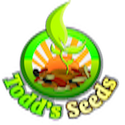Product Overview
Bundled Chemical-Free Alfalfa Sprouting Seeds, 1 lb, & Mung Bean Sprouting Seeds, 1 lb, Total of 2 lbs
**Product Description:**
Are you ready to embark on a journey to fresher, healthier eating? Todd's Seeds has you covered with our Bundled Chemical-Free Alfalfa Sprouting Seeds and Mung Bean Sprouting Seeds. These two nutritious powerhouses are a must-have addition to your kitchen, allowing you to grow your own sprouts that are free of chemicals and bursting with flavor and nutrition.
**Alfalfa Sprouting Seeds:**
- **Quality:** Our alfalfa sprouting seeds are carefully selected for their high germination rate and excellent sprouting potential. You can trust Todd's Seeds to provide you with top-quality, chemical-free seeds.
- **Nutrient-Rich:** Alfalfa sprouts are a nutritional powerhouse, loaded with vitamins (A, B, C, E, and K), minerals (calcium, potassium, and iron), and antioxidants. They are also a great source of protein and dietary fiber.
- **Delicious and Versatile:** Add alfalfa sprouts to salads, sandwiches, wraps, and more to elevate the flavor and nutritional content of your meals. They have a mild, nutty taste that complements a wide range of dishes.
**Mung Bean Sprouting Seeds:**
- **Purity:** Our mung bean sprouting seeds are chemical-free and chosen for their superior quality. You can sprout them with confidence, knowing you're getting the best.
- **Nutritional Powerhouse:** Mung bean sprouts are rich in essential nutrients, including vitamin C, folate, potassium, and fiber. They are known for their protein content and are a great choice for vegetarians and vegans.
- **Versatile in the Kitchen:** Mung bean sprouts add a delightful crunch to salads, stir-fries, soups, and noodle dishes. Their fresh and crisp texture enhances both the taste and presentation of your culinary creations.
**Growing Your Sprouts:**
Growing alfalfa and mung bean sprouts at home is simple and fun. With our bundled seeds, you can enjoy the process of nurturing these nutritious sprouts from start to finish. Follow the included sprouting instructions to get started on your journey to healthier eating.
**Todd's Seeds Guarantee:**
At Todd's Seeds, we are committed to providing you with the highest-quality sprouting seeds. Our bundled Chemical-Free Alfalfa Sprouting Seeds and Mung Bean Sprouting Seeds are carefully selected for excellent germination and robust growth. Take the first step toward fresher, healthier eating by growing your own sprouts with Todd's Seeds. It's time to savor the flavors and benefits of homegrown goodness. Happy sprouting and happy eating!









